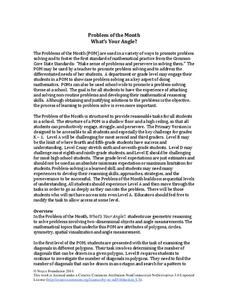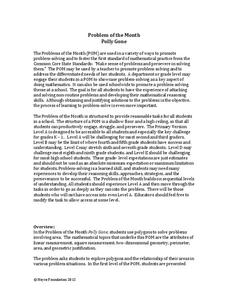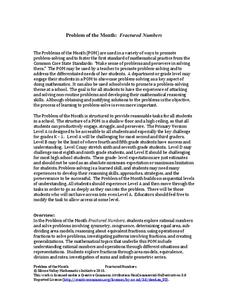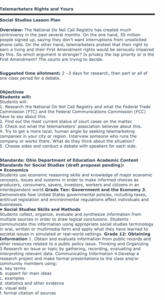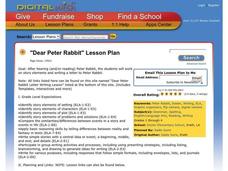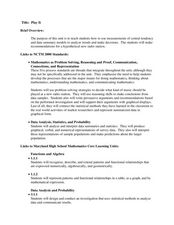Noyce Foundation
Surrounded and Covered
What effect does changing the perimeter have on the area of a figure? The five problems in the resource explore this question at various grade levels. Elementary problems focus on the perimeter of rectangles and irregular figures with...
Noyce Foundation
What's Your Angle?
Math can be a work of art! Reach your artistic pupils as they explore angle measures. A creative set of five problems of varying levels has young learners study interior and exterior angle measures of polygons. The introductory levels...
Noyce Foundation
Tri-Triangles
Develop an understanding of algebraic sequences through an exploration of patterns. Five leveled problems target grade levels from elementary through high school. Each problem asks young mathematicians to recognize a geometric pattern....
Noyce Foundation
Movin 'n Groovin
Examine the consequences of varying speed. An engaging set of five problem sets challenges young mathematicians by targeting a different grade level from K-12. In the initial lesson, scholars make conclusions about the time it takes two...
Noyce Foundation
Poly-Gone
Investigate polygons from rectangles to triangles to octagons. Each level of the five-problem series targets a different grade level. Beginning with the level A problem, learners examine the relationship between area and perimeter by...
Noyce Foundation
Cubism
If cubism were a religion, would you follow it? Lower-level tasks focus primarily on counting the number cubes in a structure and relating the number to surface area. As learners progress to higher-level tasks, isometric drawings and...
Noyce Foundation
Lyle's Triangles
Try five problems on triangles. Levels A and B focus on shapes that can be created from right triangles. Level C touches upon the relationship between the area of a six-pointed star and the area of each triangle of which it is composed....
Noyce Foundation
Piece it Together
Score some problems all related to soccer balls. The first few problems focus on pattern blocks to see relationships between figures. More advanced problems focus on actual soccer balls, the patterns on the balls, and their volumes and...
Noyce Foundation
Fractured Numbers
Don't use use a fraction of the resource — use it all! Scholars attempt a set of five problem-of-the-month challenges on fractions. Levels A and B focus on creating fractions and equivalent fractions, while Levels C, D, and E touch on...
Noyce Foundation
Part and Whole
Now you'll never have trouble cutting a cake evenly again. Here is a set of five problems all about partitioning shapes into a given number of pieces and identifying the fractional amount of each piece. As learners progress through the...
Curated OER
Telemarketers Rights and Yours
Learners research the controversy of whether or not the National Do Not Call Registry is constitutional, and then hold a class debate. Students research the National Do Not Call Registry, the FTC, the FCC, and the most current status of...
Curated OER
Problematic Situation: the Outsiders
In this The Outsiders problematic situation worksheet, learners read a scenario pertaining to a gang member's death. Students then mark whether they agree of disagree with 12 statements.
Curated OER
Spelling Clue Race
Pupils decode clues in order to correctly spell words. They find clues hidden in the classroom to review for their spelling test. Perhaps this isn't the most effective way to review, but it is creative, so it's likely to capture the...
Curated OER
Dear Peter Rabbit
Write dear old Peter Rabbit a letter with this lesson. First, youngsters listen to the story Peter Rabbit and analyze the story elements. Then they complete a story map graphic organizer in order to write a letter to Peter Rabbit using...
Curated OER
Counteracting Media Stereotyping
Discuss media stereotypes with your emerging consumers. They view a television program to identify gender bias. After discussing the clip as a class, each learner writes a story showing more equitable roles. Or consider having them...
Curated OER
Play It
There are a number of activities here that look at representing data in different ways. One activity, has young data analysts conduct a class survey regarding a new radio station, summarize a data set, and use central tendencies to...
Curated OER
Pirate Map
Students write directions explaining how to get from one location to another by using a map of their town and use simple maps to identify and locate places.
Curated OER
Small Group Reading
It's the age of technology! The idea of computer literacy and fluency are rapidly gaining importance; can your learners keep up? To keep them interacting with technology, bring them to the computer lab for small group reading...
Curated OER
Human Rights And Refugees: The Right To Asylum
Students read the Universal Declaration of Human Rights, define asylum and identify when people have the right to asylum. They examine specific cases of asylum in recent times and consider some of the difficulties refugees face.
Curated OER
We All Live Together
First graders examine the lifestyle of classroom and family pets in their natural habitat. They determine the needs of plants and animals, and how those needs are met. They listen to read alouds, sing songs, and draw using computer based...
Curated OER
Whose money is it?
Students perform research on the Web, in books and by contacting lawyers to find out what steps the court goes through to decide who gets the money. They create a chart to illustrate what laws or policies the court follows.
Curated OER
It's Raining Cats and Dogs! Literary Devices and Figurative Language
Third and fourth graders study literary devices and figurative language. They view a PowerPoint presentation (which you must create) to review hyperbole, idiom, simile, and metaphor. They read and discuss the book There's A Frog in My...
Curated OER
Writing: Narrative, Expository, Persuasive, and Descriptive
If you are interested in having a basic framework for teaching expository, narrative, persuasive, and descriptive writing, this resource may help; however, you will have to find information on the different forms of writing to share with...
Shmoop
ELA.CCSS.ELA-Literacy.SL.9-10.3
Don't let your pupils take everything at face value! They should analyze and evaluate what speakers say. Practice this skill with the two related activities described here. After brainstorming critical questions, learners can listen to...
Other popular searches
- Logical Thinking and Reasoning
- Deductive Reasoning Skills
- Thinking & Reasoning Skills
- Inferential Reasoning Skills
- Inductive Reasoning Skills
- Logical Thinking Puzzles
- Deduction Reasoning Skills
- Math Reasoning Skills
- Practical Reasoning Skills
- Logical Thinking Hats
- Logical Thinking Writing
- Logical Thinking Math



